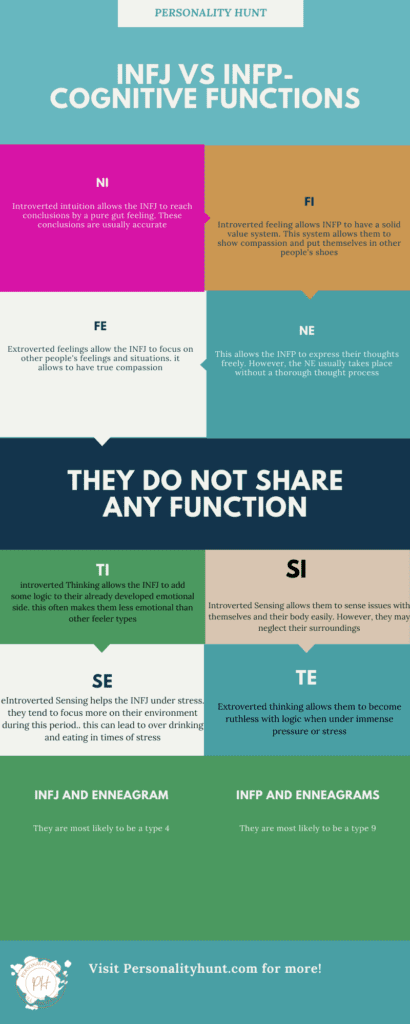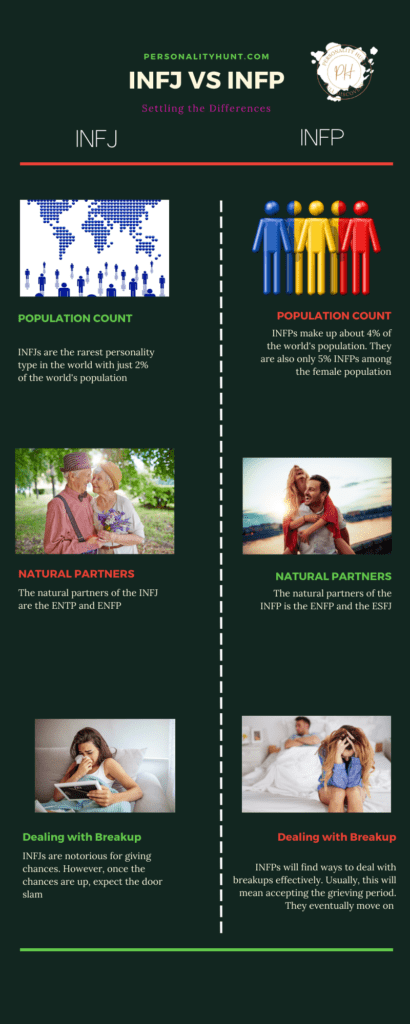Are you currently stuck between the INFP and INFJ MBTI personality types? If you are, you should know that it’s completely normal. The INFP and INFJ personality can seem very similar on the surface. If your MBTI tests show that you are on the borderline between J and P functions, then you should probably read this article on INFP vs INFJ.
This is a complete guide on the differences between the two personalities.
INFP vs INFJ- Their Cognitive Stack
The INFP and INFJ were formulated by the Myers-Briggs Foundation. The real driving force within each type is their cognitive functions. Cognitive functions simply refer to the way each personality type prefers to process information. There are eight cognitive functions. Each of them has an impact on how we see things. However, we rely mostly on our dominant four.
These functions are Ni, Ne, Te, Ti, Fe, Fi, Se, and Si. Ne for example means extroverted intuition while Ni means introverted intuition. This shows that the second letter for each function stands for extroverted (e) and introverted (i)
For the INFP, their cognitive functions are Fi, Ne, Si, Te, Fe, Ni, Se, and Ti while the INFJ has Ni, Fe, Ti, Se, Ne, Fi, Se, and Ni.
What Does Their Cognitive Function Stack Mean?
The first thing you’ll quickly notice is how different the INFP and INFJ functions are. For example, the INFP uses introverted feeling (FI) as their first function. This function helps the INFP maintain a value system that is personal to them. It also means that they make their decisions based on this system.
For the INFJ, they start off with Ni. This means that their intuition is introverted. Most INFJs who use Ni understand the patterns and draw accurate conclusions quickly. It is often referred to as one of the most interesting cognitive functions.
Looking at their cognitive functions will also help you understand just how different they are. They actually do not share a single function.
INFP vs INFJ- Population Count
There is also a difference between both personality types when it comes to population count. The INFJ is notorious for being the rarest personality type in the world. This also means that they can feel out of place and isolated in the world they live in. it also gives them the feeling of uniqueness. Truity puts their numbers at only 2% of the total population.
INFPs, on the other hand, make up about 4% of the total population. Truity puts their number at 5% of the world’s female population.

INFP and INFJ- Under Stress

When under stress, the MBTI personality types will usually resort to their 4th function to deal with it. For the INFJ, this means resorting to Se. Extroverted sensing uses the environment to deal with stress. So, don’t be surprised to see the INFJ going hard on hobbies that involve the environment. Things like excessive drinking and eating and playing sports to an extreme are all signs of an INFJ under stress.
For the INFP, they use their Te (Extroverted Thinking) to deal with stressful situations. This means that the INFP will usually turn to clear and precise thinking to deal with stressful situations. During this period, the once happy and emotional INFP might not allow any room for any emotions or feelings. It is not also out of room for them to give harsh criticism of others.
They might become judgmental. If this is what you do, then you’re definitely an INFP.
INFJ vs INFP- Relationships and Love
INFJ
One of the clear differences between the INFJ and INFP is how they treat love and relationships. For the INFJ, love is a way to build clear and strong bonds with another person. For that reason, the INFJ is always hesitant to jump right in. They are one of the types that like to test the waters first before committing to a relationship.
The INFJ can also show a lot of fear when it comes to starting new relationships. Because they are looking for a partner that will always be there, they usually are meticulous when searching for the right one. They are almost always looking for a long-term relationship. This makes them more likely to avoid casual flings or one-night stands.
INFJs will always start by throwing signals and bread crumbs for their partners to follow. If you are an INFJ, it might be a good idea to actually be clear with your intentions from the very beginning. You will be much better off and your partner will be glad you did too. The INFJ natural partners are the ENTP and the ENFP.
INFP
For the INFP, they are similar to the INFJ when it comes to relationships. However, there are some notable differences. The INFP is an idealist personality. They want perfection in their lives. This can easily translate to their jobs and partners. While they are idealistic, it doesn’t show at first in their relationship.
INFPs will usually hold their partners in the highest regard at the start of their relationship. However, as the relationship progresses, that idealistic feeling slowly fades. This now allows them to see their partner’s errors and flaws. An unhealthy INFP may soon start comparing their partners to their idealist standards. This can put a strain on the relationship. Their partners might also have low self-confidence.
At their best, INFPs can be really loyal and supportive. They are also focused on harmony with their partners. This means that they try their best to stay out of conflict. The natural partner of the INFP is the ENFJ. They are also highly compatible with the ESFJ. However, any two mature adults can make a relationship work.
INFP vs INFJ- Dealing with Emotions

When it comes to dealing with emotions, most personality types lead with different cognitive functions. The INFJ leads with Fe. This means that they are more likely to focus on other people’s emotions. INFJs are also more likely to be empaths than other types. They feel how other people feel deeply.
While this is a good thing, it often has some drawbacks. INFJs will almost always forget their own emotions in the process. Their Fe means that their own emotions might come second fiddle to others. However, in situations where the INFJ feels deeply about a certain issue, this can easily change.
On the other hand, INFPs lead with the Fi function. This means that emotions are internalized. They see other people’s emotions through a mirror of themselves. This allows them to put themselves in other people’s shoes. It also allows them to understand the depth of emotions a person feels if they have also faced a similar problem before.
INFP vs INFJ- in the Workplace

The INFJ at the workplace is completely dedicated to making things better for most customers and humanity in general. The INFJs are often very organized and idealistic. This often transfers itself to the workplace.
The INFJ’s best work environment will be one that is quiet and quite open to creative ideas. They often perform best when the workplace is without conflict and is directed at improving the world. Some of the best career options for the INFJ include
- Pharmacists
- Nutritionist
- Social scientist
- Clergy or evangelist
- Social worker
The INFP often chooses work that touches their own value systems. They are also excellent at solving problems and working on tasks that are interesting to them. They are hardly motivated by the need to acquire wealth or accumulate large resources.
If there is one thing that irks the INFP in the workplace, that is being micro-managed. The INFP loves to handle their work as they deem fit. Thus, the best working environment for this personality type is one where there are free to do as they see fit. Despite this freedom, the INFP is often serious with their jobs and will largely meet any deadlines set.
Some of the best career options for an INFP includes
- Writer
- Psychologist
- Photographer
- Fine Artist
- Film Producer
- Freelancer
- Human resource manager
INFJ vs INFP- Enneagram Types
According to Thought Catalog, INFP types are more likely to be type 9 than any other type. This rhymes with their need to avoid all forms of conflicts especially with friends and loved ones. Other types that have a strong correlation with the INFP includes type 6 and 4 in that order.
The INFJ, on the other hand, are more likely to be type 4 than any other type. This stems from their need to be unique. It could be because they are simply the rarest personality type in the MBTI. Other types that have a strong correlation with the INFJ are type 1 and 5 in that order.
INFP vs INFJ- as Children

The INFJ child is often going to be shy and very sensitive. This means that harsh criticism is simply a NO for the INFJ. They are also likely to want to be very private with their life. However, the INFJ child also desires to be liked by all. They also have a strong sense of right and wrong at an early age. This means that they are less likely to go along with others just for the sake of it.
They will often get into trouble for standing up for what they believe in at school or elsewhere. For the INFJ child to become the best versions of themselves, they need lots of emotional attention.
The INFP child is just as sensitive as the INFJ child. However, the INFP child is also very imaginative. While this means that they can be very creative, it also means they will find it hard to focus. Even as a child, your INFP is an introvert. This means that while they enjoy creating connections with you, you also have to give them their own space. They’ll love you even more.
INFP and INFJ- Spontaneous or Organized?
The INFP leads with the Perceiving function. This means that they are very likely to be spontaneous. This also means that they might find it hard to stick with a plan. This can cause indiscipline with travel arrangements as well as handling tasks and chores. The INFP also loves adventures and would not cope well in a rigid or structured environment.
The INFJ, on the other hand, is much more organized. This is because they lead with the Judging (J) function. They also do well when events are planned long ahead. They find it easier to cope with tasks and chores. Just give the INFJ a heads-up long before the event and they will definitely be ready.

INFJ vs INFP- Dealing with Breakup and Betrayal
When it comes to dealing with breakups and betrayal, the INFP shows amazing strength. They deal with it by just simply feeling everything it throws at them. This has proven to be an effective way to deal with issues. Once they are done feeling it, the INFP can move on peacefully.
The INFJ, on the other hand, is known for giving their loved ones a lot of chances. Sometimes, these chances given might seem unreasonable to others. However, once the INFJ has decided that they have had enough or you have betrayed them, they quickly withdraw from you. Most writers call this the INFJ door slam.
They will dwell in solitude as this allows them to process the pain that they currently feel.
Conclusion
The INFP and the INFJ are two similar, yet completely different personalities. Do you identify with any of these personalities? If you do, then you should know you have a beautiful personality.
































